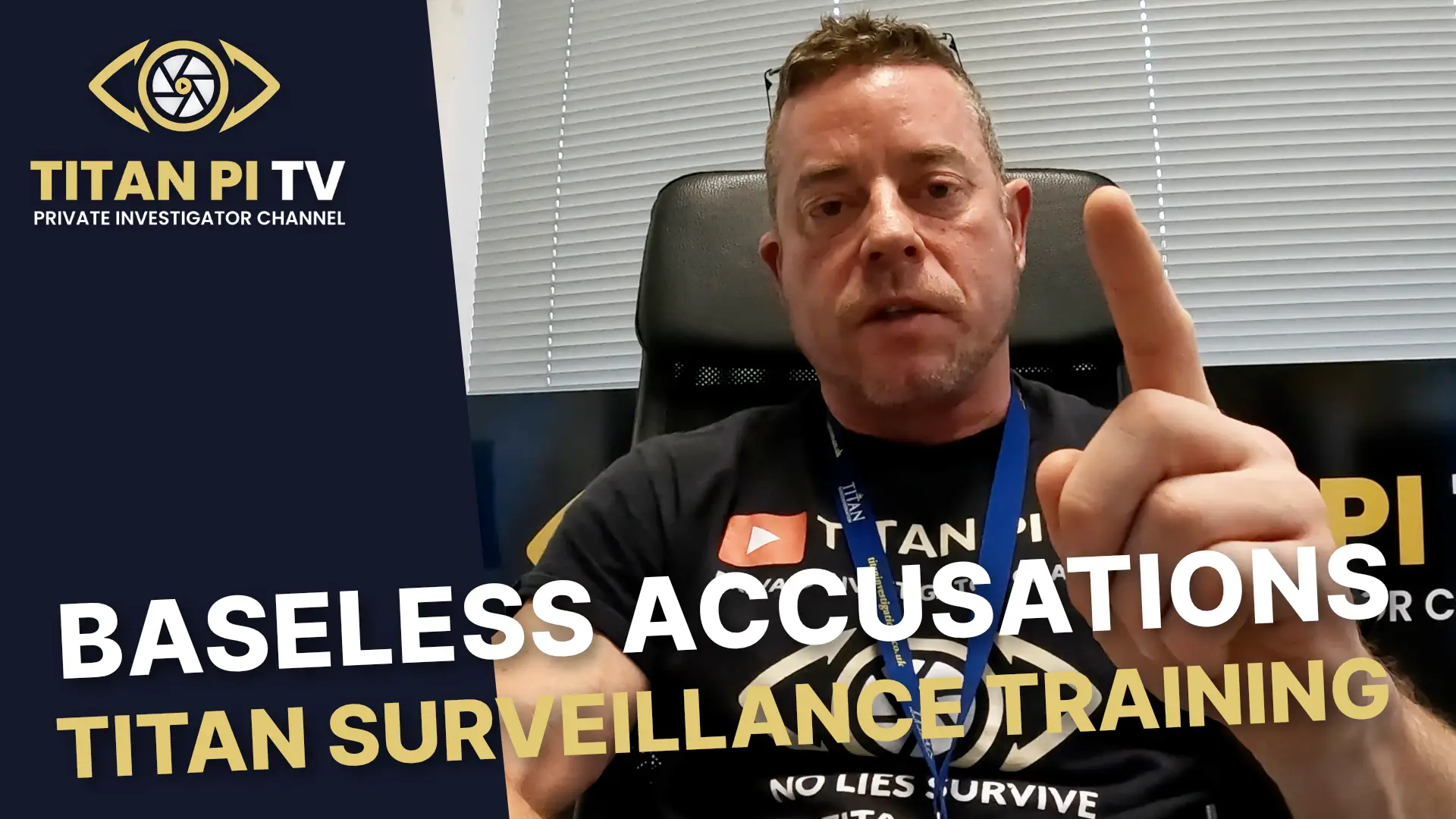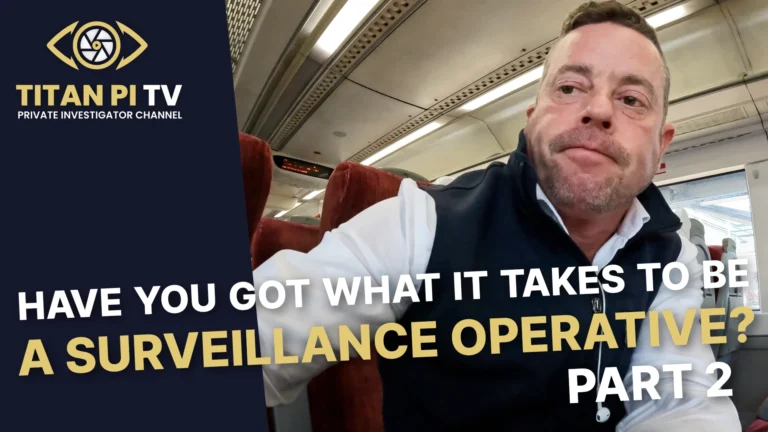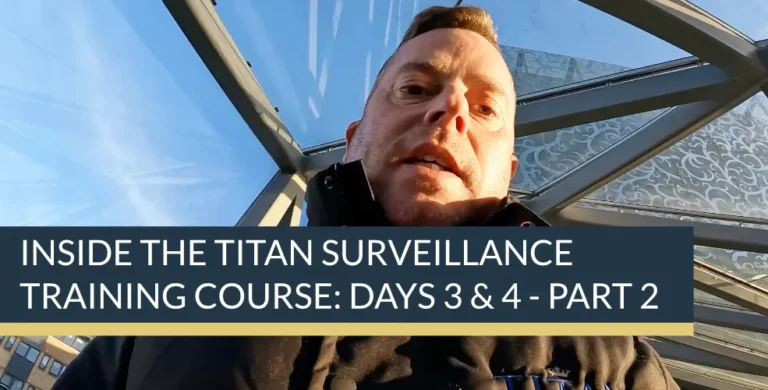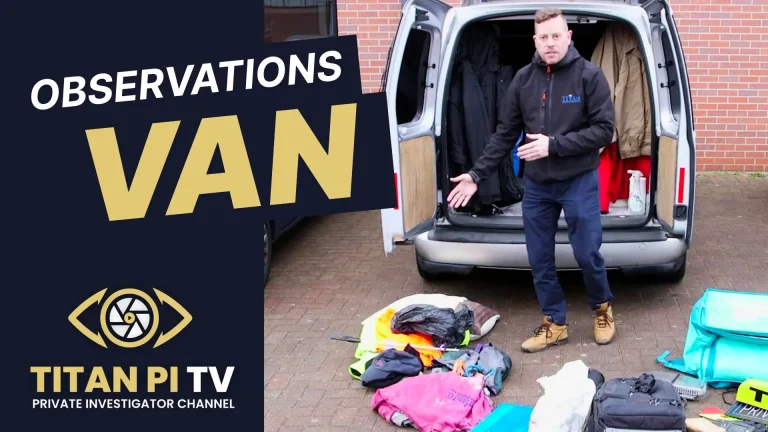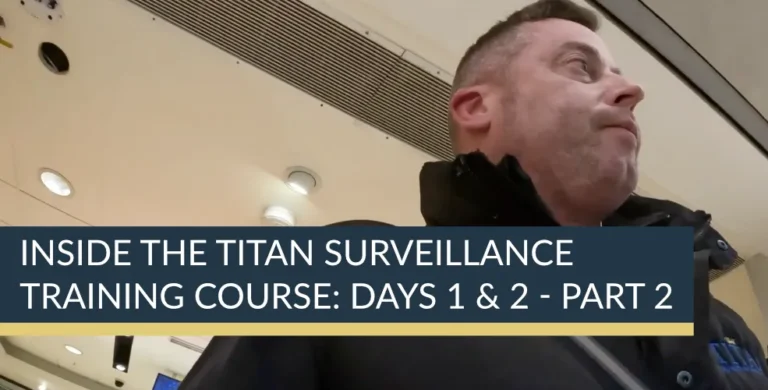Baseless Accusations – Titan Surveillance Training
A closer look at how one unfounded claim can distort the reality of a well‑regarded training course.
In the latest episode of Titan PI TV, host and managing director of Titan Private Investigation Limited, Simon Henson, addresses a subject every reputable training provider must be prepared to confront: the damage a single baseless accusation can inflict on years of hard work, high standards, and consistently positive learner outcomes.
Broadcast from Titan’s headquarters in Derby, the episode sets the record straight on the structure and substance of Titan’s surveillance training, the rigorous quality controls around it, and the context behind a recent complaint from one learner who—despite providing positive feedback at the end of the course—demanded a full refund days later and made disparaging comments in a professional WhatsApp group for close protection operatives.
The result is a candid, professional, and unflinching exploration of reputation management in the private investigations sector—backed by facts, timelines, and third‑party oversight.
National coverage, consistent standards
Titan Private Investigation operates out of ten offices—from Truro in the South West to Manchester in the North West—enabling national coverage for both live operations and professional training. Since 2017, Titan has delivered four surveillance courses annually, scheduled in February, May, September and November. Over eight years of delivery, the company has never received a formal complaint about the training.
That record, Simon Henson notes, is not incidental. Titan’s training is designed by active practitioners and delivered by experienced professionals. For delegates pursuing a regulated route, the programme is aligned to the RQF Level 4 standard and overseen in conjunction with the Institute of Professional Investigators (IPI), with Skills for Justice as the awarding body. Two Titan trainers sit on the IPI board, underscoring the programme’s integration with the professional standards community.
For delegates who opt not to pursue the formal RQF credential, Titan issues a certificate of achievement documenting attendance, successful completion to the required standard, and the modules covered. Those who choose the regulated pathway enrol via IPI, pay the applicable administration fee, complete the Titan course, and then submit their assessed workbook within 28 days to secure the Skills for Justice qualification at Level 4—broadly recognised as just above A‑level.
Inside the September course: intensity, structure and assessment
The episode centres on a five‑day training course delivered 15–19 September 2025, attended by 12 learners. Four of these were registered for the RQF Level 4; eight chose the Titan certificate route. It is an intensive programme by design: days begin at 08:00 and frequently run into the early evening, reflecting the tempo and demands of live surveillance operations.
Mornings focus on classroom theory; afternoons translate that learning directly into the field under assessment. Prior to arrival, each learner is assigned 15–17 hours of online pre‑learning across 17 modules, covering theoretical foundations so they can “hit the ground running” on day one. This structured blend of pre‑work, instruction, practice and assessment optimises the time in person and primes learners for real‑world performance.
Module coverage is comprehensive. Among the core subjects:
- Surveillance law and the principles governing lawful, ethical practice
- Radio and mobile communications under operational conditions
- Cover stories and subject identification
- Foot surveillance using ABC formations, corner clearing, handovers and use of street “furniture” to maintain cover
- Public transport surveillance techniques
- Anti‑surveillance awareness
- Mobile surveillance—following a subject from a vehicle, stepping up to road speed and urban complexity
- Stop and plot—maintaining a sterile zone when a subject stops or enters premises
- Multi‑storey car park plotting and movement management
- Evidential imagery—capturing footage to evidential standard; without imagery, Simon stresses, “you’re the worst team in the world because you’ve nothing to show”
- Loss procedures—recovering contact on foot and in vehicles
- Static observation points
- Evidential logs—kept for every task with potential court disposition, and in practice encouraged for all tasks
- Technical surveillance, including lawful use of GPS tracking devices
- Report writing to professional and evidential standards
The breadth and depth are non‑negotiable. The aim is to train surveillance operatives who can be deployed operationally with confidence—understanding the law, operating seamlessly as a team, maintaining cover and capturing evidence that stands up to scrutiny.
The feedback—and the reversal
On 19 September, as with every course, Titan invited learner feedback. This is optional but strongly encouraged, and it informs continuous improvement. The learner at the centre of this episode submitted feedback that was unambiguously positive:
- What did you like most about the course? “Surveillance exercises.”
- Was anything challenging? “Glossary.”
- Was the content relevant and useful? “Yes.”
- Was the structure and length appropriate? “Yes.”
- Did you achieve your learning needs? “Yes.”
- Were you unable to express your feelings at any point? “No.”
- Any suggestions to improve? “No.”
- Overall rating (1–5, with 5 exceptional): “4.”
Five days later, on 24 September, the same learner emailed to ask when their certificate would be ready, and in the same message requested a full or partial refund, stating they would not use Titan’s name to gain employment and were “extremely disappointed”, claiming they had not gained “absolutely anything” from the course. The learner then asked for a full refund of £1,440 (inclusive of VAT) and asserted they would have benefited more from a course delivered by an ex‑military training provider.
Simon telephoned to confirm the message wasn’t a misunderstanding; it was not. He responded professionally, inviting a detailed rationale for the refund request, especially given the documented content delivered, the structure of the course and the learner’s own positive feedback.
The allegations, examined point by point
The learner’s subsequent list of reasons read as follows:
- “When I first opened the portal, the course work was not on there.”
- Titan’s response: there was a temporary technical issue on the learning platform. Within 12 hours, the content was restored and available in time for the course. Apologies were given. Occasional technical interruptions are a reality of online delivery; what matters is prompt remediation, which occurred.
- “In my experience of teaching through the military, I knew my material and did not need to read it from a tablet.”
- Titan’s response: none of the trainers use a tablet to read content. A laptop projects slides and structured content to the room. Trainers—who “know this course inside out”—deliver from experience, not a script. The claim is factually incorrect.
- “The attendance certificate is barbaric and not suitable or professional to show any employer.”
- Titan’s response: the Titan certificate of achievement is not a regulated qualification; it evidences attendance, successful completion to required standard, dates, and the list of modules covered. For those seeking a regulated credential, the RQF Level 4 is available via IPI and Skills for Justice.
- “The fact that I am having to point these things out to your company is ridiculous.”
- Titan’s response: constructive feedback is always welcomed and is part of continuous improvement. However, generalised statements without specific, substantiated examples do not support a refund claim—particularly when contradicted by contemporaneous positive feedback.
- “I don’t feel that I gained any skills or knowledge from the course… extremely disappointed and unsatisfied.”
- Titan’s response: this assertion is inconsistent with the learner’s own end‑of‑course evaluation (including a 4/5 rating and affirmative answers on relevance, structure and achievement of learning needs). It also conflicts with outcomes for the other 11 learners, the majority of whom have since undertaken operational work with Titan.
In the days following, the learner repeated their negative claims in a professional WhatsApp group. By contrast, the other delegates reported strong experiences, and several progressed directly into Titan’s operational pipeline.
Independent scrutiny: external assessment present
A key fact of the September programme is that Titan was externally assessed during delivery. An independent assessor from the awarding structure attended to ensure the syllabus, assessment and instructional practice met the standard. This additional layer of oversight further contradicts the notion of a substandard course.
As Simon notes, all training providers delivering the RQF Level 4 surveillance syllabus are teaching to the same core outcomes and standards. Differences exist in style, scenario design and instructor background, but the competencies are regulated. It is possible, he suggests, that another provider—perhaps with a military marketing emphasis—encouraged the learner’s change of heart after the fact. Regardless, regulated outcomes and external quality assurance exist precisely to guard against subjective, post‑hoc narratives that are inconsistent with evidence.
Traits of a surveillance operative—and selection reality
The episode also reflects on professional suitability. Surveillance is a team discipline requiring composure, attention to detail, communication, adherence to lawful boundaries and an evidence‑first mindset. Following further enquiries, Titan learned that the complainant’s standing within the close protection industry included a record of walking off jobs and being dismissed, hardly markers of the reliability needed in surveillance operations. While Titan conducts initial vetting to ensure sensitive skills do not fall into the wrong hands, personality and professional reliability are more difficult to ascertain before a course begins. In this case, there were no “alarm bells” during delivery, making the subsequent escalation all the more surprising.
What is not in doubt, Simon says, is that this individual will not be working for Titan Private Investigation Ltd. The company’s operational integrity, and clients’ expectations, require dependable and fully committed professionals.
Why baseless accusations matter
For organisations whose reputation is their currency, unfounded claims can ripple beyond a single inbox. They can sow doubt among prospective learners, distract staff and undermine trust painstakingly built over years. Titan’s response illuminates a responsible pathway: document everything, invite specifics, assess claims against contemporaneous records, and be transparent about process, standards and oversight.
It is also a reminder to learners and employers alike: weigh public comments against objective indicators. Look for:
- Documented curricula and module lists
- Independent oversight or accreditation
- Consistency of learner feedback at the time of delivery
- Evidence of real‑world deployment opportunities and aftercare
- Alignment between marketing claims and assessed outcomes
On each of these measures, Titan’s programme is clear and consistent.
Training that leads somewhere: aftercare and deployment
A major value proposition of Titan’s training is what comes after. Learners who meet the required standard are invited onto the Grow Student Aftercare programme: structured exposure to operational work, further skills development and the chance to build a track record. This isn’t training for training’s sake; it is a talent pipeline that allows Titan to meet operational demand with practitioners it knows, trusts and has assessed in realistic scenarios.
In practice, that means the course is delivered at the “advanced syllabus” level over five days, with the exception of two modules—Open Source Intelligence (OSINT) and Night‑time Surveillance—sometimes included in November cohorts when daylight hours allow. The aim is to equip learners with the competencies needed to contribute on day one, under supervision, in a professional team context.
Next dates, and how to join
The next five‑day course runs 17–21 November 2025 and is currently scheduled for nine learners—ideal for a three‑vehicle mobile surveillance configuration and three‑instructor foot‑surveillance teams. Titan will again deliver four courses next year in February 2026, May 2026, September 2026 and November 2026, with dates to be released in November.
For details or to register interest, visit the Training section at Titan Private Investigation, navigate to the Five‑Day Basic Surveillance Course, and use the confidential contact form, email or phone to get started. The course is also covered extensively across recent episodes of Titan PI TV, four recent videos showcase different aspects of the programme—so prospective delegates can see the training in action before committing.
For those who prefer audio, the Titan PI TV Podcast is available to download wherever you get your podcasts.
Professionalism, transparency, and moving forward
Simon closes the episode with thanks to Titan PI TV’s growing community—now approaching the 3,000‑subscriber mark—and a reaffirmation of the company’s ethos: own the facts, share the process, invite scrutiny, and carry on doing the work to the highest standard. A single unsubstantiated narrative will not define a programme that is independently reviewed, consistently well‑received and demonstrably effective in the field.
“Sorry for the rant,” he offers with a wry smile, “but it’s good to get that out there.” With that, he returns to the essentials—keeping people safe, delivering for clients, and training the next cohort of professional surveillance operatives who will do the same.
If you don’t want to miss future episodes, subscribe to Titan PI TV on YouTube—it’s free—and give the video a thumbs‑up to support the channel. Stay safe, and see you next week.
What’s Next on Titan PI TV?
Titan PI TV continues to grow steadily, with 2,946 subscribers and counting—a testament to the appetite for straight-talking guidance in a complex field. If you found Simon Henson’s insights useful, subscribe to the channel to catch future episodes. New content drops every Friday at 3:00 pm, offering grounded advice for investigators, agency owners, and professionals who work with them.
Thank you for reading, watching, or listening to this week’s blog post on Titan PI TV. For more expert advice and behind-the-scenes insights, subscribe to Titan PI TV on YouTube or download the Titan PI TV podcast wherever you get your podcasts. If you found this information helpful, please give us a thumbs up and subscribe to our channel. Stay tuned for more insights into the world of private investigations. Until next time, stay safe and keep learning!
Titan PI TV: Uncovering the Truth, One Investigation at a Time.

